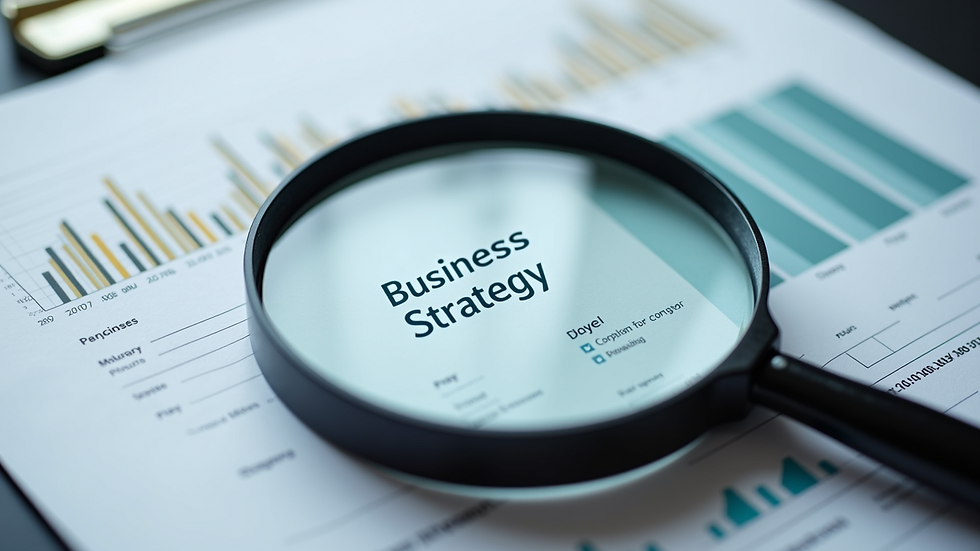Uncovering the Perfect Consultant: Navigating the Search for Expert Guidance
- Md Sabbir Alam

- Mar 26
- 3 min read
Finding the right consultant is not just a task; it can be a game-changer for your project. With numerous options available, all claiming to be experts in their fields, how do you choose the one that meets your needs? This post will provide practical steps and considerations to help you find the ideal consultant tailored to your specific requirements.
Understanding Your Needs
Before you set out to find a consultant, it's crucial to have a firm grasp of your needs. Ask yourself:
What are my primary goals? For instance, if you're launching a new product, you may need someone with marketing expertise.
What challenges do I face? Identifying these will help you communicate effectively with prospective consultants.
Start by writing down your expectations and objectives. This action will streamline your search and facilitate clearer discussions with potential hires.
Researching Consultants
With a clear idea of your needs, it’s time to dive into research. Use various online resources like LinkedIn, industry-specific forums, and social media platforms to scout for potential consultants. Networking is invaluable; consult with colleagues or industry contacts for recommendations.
Create a shortlist that includes their qualifications, areas of expertise, and reviews from previous clients. For example, if you need financial consulting, look for someone who has worked with companies similar to yours. An audited client list or case studies showcasing successful outcomes can signal a consultant's fit for your project.
Evaluating Expertise
Now that you have a narrowed list, assess each candidate's qualifications. Look for specific credentials or successful experience in your industry.
Request case studies or examples of their previous work that directly relate to your needs. For instance, if you are considering a consultant for operational efficiency, ask for details of a business where they reduced operational costs by 20% or improved process efficiency by 30%. This information will illustrate their capability to deliver results.
Conducting Interviews
Scheduling interviews with your final candidates lets you gauge their fit more closely. This step is crucial as it provides insight into their operational style and communication skills.
Ask thought-provoking questions that require candidates to elaborate on their strategies. For example, inquire, “How would you approach scaling our operations to meet a 15% growth target?” This kind of questioning reveals their critical thinking and ability to adapt to your specific situation.
Assessing Compatibility
Compatibility in communication and values is as critical as expertise. Your consultant will work closely with you, so look for someone who shares your vision.
Observe how candidates handle your questions. Do they listen actively and engage with your ideas? A consultant who shows genuine interest will likely be more invested in achieving your goals. For instance, a candidate who suggests custom solutions rather than generic fixes shows they are focused on your success.
Checking References
Before making your final choice, check references. A skilled consultant should provide at least two or three contacts who can speak to their professionalism and abilities.
When contacting references, be specific with your questions. Ask about the consultant's reliability, problem-solving skills, and ability to meet deadlines. A solid reference can illuminate what you might expect from your partnership, reducing the risk of disappointment later.
Setting Clear Expectations
Once you’ve selected a consultant, it’s critical to establish clear expectations from the start. Clearly define your project's objectives, timelines, and deliverables.
For example, if your project spans six months, outline each phase, key milestones, and the methods of communication you'll use. Drafting a formal agreement can serve as both a reference and a commitment for both parties.
Embracing Collaboration
Remember that a consultant is there to enhance your team, not replace it. Be ready to collaborate closely with your chosen consultant, as this can lead to better outcomes.
Maintain an open line of communication throughout your partnership. Regular discussions can foster a productive working relationship. For example, schedule weekly check-ins to share updates and brainstorm solutions. This collaborative approach will help both you and the consultant stay focused on shared objectives.
Evaluating Progress and Results
Regularly evaluate the progress throughout the consultancy engagement. Set up consistent check-ins to review whether objectives are being met and to discuss potential adjustments.
By having a structured evaluation process, you can stay actively involved in the project's direction and ensure the consulting investment is yielding positive returns.
Final Thoughts
Finding the perfect consultant is an essential step towards achieving your project goals. By following this guide—understanding your needs, researching candidates, evaluating expertise, conducting interviews, assessing compatibility, checking references, setting expectations, embracing collaboration, and evaluating progress—you can discover a consultant who meets your requirements.
Taking the time to find the right expert can significantly benefit your organization by providing valuable insights and guidance.




Comments